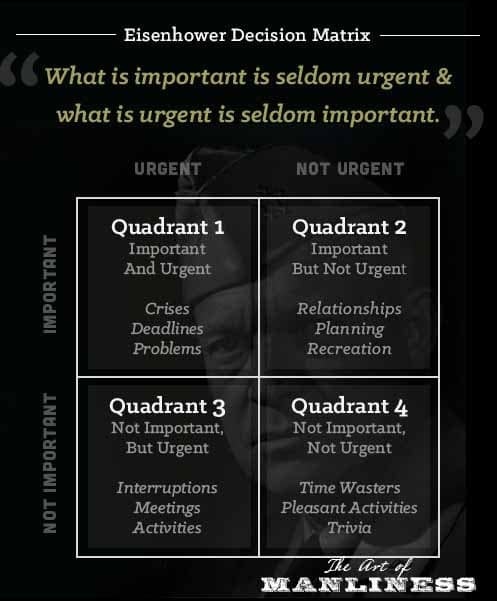Urgent or Important

“I have two kinds of problems: the urgent and the important. The urgent are not important, and the important are never urgent.” President Dwight D. Eisenhower spoke these words in 1954 to a gathering of church leaders. It is interesting to hear those words coming from a man who had to make major decisions every day.
Urgent means that a task requires immediate attention. These are the to-do’s that shout “Now!” Urgent tasks put us in a reactive mode, one marked by a defensive, negative, hurried, and narrowly-focused mindset.
Important tasks are things that contribute to our long-term mission, values, and goals. Sometimes important tasks are also urgent, but typically they’re not. When we focus on important activities we operate in a responsive mode, which helps us remain calm, rational, and open to new opportunities.
It’s a pretty intuitive distinction, yet most of us frequently fall into the trap of believing that all urgent activities are also important. This propensity likely has roots in our evolutionary history; our ancestors concentrated more on short-term concerns than long-term strategy, as tending to immediate stimuli (like a charging saber-toothed cat) could mean the difference between life and death.
Now stop and think about it, what things truly fall into both categories: Exercise is important, but not urgent. An text message may be extremely urgent, but not necessarily important. One example of something in both categories could be a medical emergency. Something could be never. Below is what is called The Eisenhower Decision Matrix

The matrix consists of a square divided into four boxes, or quadrants, labeled: 1)Urgent/Important, 2) Not Urgent/Important, 3) Urgent/Not Important, and 4) Not Urgent/Not Important
Below we go into detail about each quadrant and explain which one we should spend most of our time in if we wish to be our best and make the most of our lives.
Quadrant 1: Urgent and Important Tasks
Quadrant 1 tasks are both urgent and important. They’re tasks that require our immediate attention and also work towards fulfilling our long-term goals and missions in life.
Quadrant 1 tasks typically consist of crises, problems, or deadlines.
Here are a few specific examples of Urgent and Important tasks:
- Certain emails (could be a job offer, an email for a new business opportunity that requires immediate action, etc.)
- Term paper deadline
- Tax deadline
- Family in emergency room
- Car engine goes out
- You have a heart attack and end up in the hospital
- You get a call from your kid’s principal saying you need to come in for a meeting about his behavior
With a bit of planning and organization, many Q1 tasks can be made more efficient or even eliminated outright. For example, instead of waiting until the last minute to work on your taxes, you could schedule your time so that you’re done with your taxes at the beginning of the year. Or instead of waiting for something in your house to fall apart and need fixing, you can follow a schedule of regular maintenance.
The greatest example of Urgent and Important Task is the task given to every disciple of Jesus Christ: sharing the good news of Christ with others. People have no more important decision to make than to choose Christ, and now is the time for us to point them to Christ and help them understand everything at stake.
Quadrant 2: Not Urgent but Important Tasks
Quadrant 2 tasks are the activities that don’t have a pressing deadline, but nonetheless help you achieve your important personal, school, and work goals as well as help you fulfill your overall mission as a man.
Q2 tasks are typically centered around strengthening relationships, planning for the future, and improving yourself.
Here are some specific examples of Not Urgent but Important Tasks:
- Long-term planning
- Exercising
- Family time
- Reading life-enriching books
- Taking a class to improve a skill
- Spending time with a rewarding hobby
- Studying
- Car and home maintenance
- Date night with wife
- Creating a budget and savings plan
- 30 minutes of work in your own home business
According to Stephen Covey, author of The 7 Habits of Highly Effective People, we should seek to spend most of our time on Q2 activities, as they’re the ones that provide us lasting happiness, fulfillment, and success. Unfortunately, there are a couple key challenges that keep us from investing enough time and energy into Q2 tasks:
- You don’t know what’s truly important to you. If you don’t have any idea what values and goals matter most to you, you obviously won’t know what things you should be spending your time on to reach those aims! Instead, you’ll latch on to whatever stimuli and to-dos are most urgent. If you feel like you’re lacking a life’s mission or aren’t sure what your core values are, I highly recommend reading our articles on developing a life plan as well as defining your core values.
- Present bias. As just discussed, we all have an inclination to focus on whatever is most pressing at the moment. Doing so is our default mode. It’s hard to get motivated to do something when there isn’t a deadline looming over our head. Departing from this fallback position takes willpower and self-discipline – qualities that don’t come naturally and must be actively cultivated and expressed.
Because Q2 activities aren’t pressing for our attention, we typically keep them forever on the backburner of our lives and tell ourselves, “I’ll get to those things ‘someday’ after I’ve taken care of this urgent stuff.” We even put off figuring out what’s most important in life, which of course only perpetuates a cycle where all we ever take care of are the most urgent to-dos on our list.
But “someday” will never come; if you’re waiting to do the important stuff until your schedule clears up a little, trust me when I say that it won’t. You’ll always feel about as busy as you are now, and if anything, life just gets busier as you get older (at least until you retire).
To overcome our inherent present-bias that prevents us from focusing on Quadrant 2 activities, we must live our lives intentionally and proactively. You can’t run your life in default mode. You have to consciously decide, “I’m going to make time for these things come hell or high water.”
Quadrant 3: Urgent and Not Important Tasks
Quadrant 3 tasks are activities that require our attention now (urgent), but don’t help us achieve our goals or fulfill our mission (not important). Most Q3 tasks are interruptions from other people and often involve helping them meet their own goals and fulfill their own priorities.
Here are some specific examples of Quadrant 3 activities:
- Phone calls
- Text messages
- Most emails (some emails could be urgent and important)
- Co-worker who comes by your desk during your prime working time to ask a favor
- Request from a former employee to write a letter of recommendation on his behalf (it’s probably important to him, but let’s face it, it’s probably not that important to you)
- Mom drops in unannounced and wants your help with a chore
According to Covey, many people spend most of their time on Q3 tasks, all the while thinking they’re working in Q1. Because Q3 tasks do help others out, they definitely feel important. Plus they’re also usually tangible tasks, the completion of which gives you that sense of satisfaction that comes from checking something off your list.
But while Q3 tasks may be important to others, they’re not important to you. They’re not necessarily bad, but they need to be balanced with your Q2 activities. Otherwise, you’ll end up feeling like you’re getting a lot done from day-to-day, while eventually realizing that you’re not actually making any progress in your own long-term goals. That’s a recipe for personal frustration and resentment towards other people.
Men who spend most of their time working on Urgent but Not Important Tasks often suffer from “Nice Guy Syndrome,” and want to constantly please others at the expense of their own happiness.
If that’s you, the solution is simple: Become more assertive and start to firmly (but politely) say no to most requests.
Quadrant 4: Not Urgent and Not Important Tasks
Quadrant 4 activities aren’t urgent and aren’t important. They’re what I like to call “dicking around” activities. Q4 activities aren’t pressing nor do they help you achieve long-term goals or fulfill your mission as a man. They’re primarily distractions.
Specific examples of Not Urgent and Not Important Tasks include:
- Watching TV
- Mindlessly surfing the web
- Playing Pokomon Go
- Scrolling through Facebook, Twitter, Instagram
- Shopping sprees
- Sleeping your day away
I think if most of us did a time audit on ourselves, we’d find that we spend an inordinate amount of time on Q4 activities. I’m sure most of us have those “I’m wasting my life” moments after we’ve spent hours surfing the web and realize we could have used that time to pursue our more ennobling life goals. No? That’s just me? Dang.
As a pragmatist, I don’t think you need to eliminate Q4 activities altogether from your life. After a particularly hectic and busy day, randomly browsing the internet or watching a favorite TV show for a half hour is exactly what my brain needs to decompress.
Instead of aiming to completely rid yourself of Not Urgent and Not Important tasks, try to only spend a very limited amount of time on them. 5% or less of your waking hours is a good goal.
Spend More Time on Important Tasks
In our present shock world, the ability to filter the signal from the noise, or distinguish between what’s urgent and what’s truly important, is an essential skill to have.
My challenge to you this week is to apply the Eisenhower Decision Matrix to as many aspects of your life as you can. When faced with a decision, stop and ask yourself, “Am I doing this because it’s important or am I doing it because it’s merely urgent?”
I promise as you spend most of your time working on Not Urgent but Important tasks, you’ll feel a renewed sense of calm, control, and composure in your life. You’ll feel like you’re making real progress. By investing your time in Q2’s planning/organizing activities, you can prevent and eliminate many of the crises and problems of Q1, balance the requests of Q3 with your own needs, and truly enjoy the veg-outs of Q4, knowing that you’ve earned the rest. By making Q2 tasks your top priority, no matter the emergency, annoyance, or deadline you’re hit with, you’ll have the mental, emotional, and physical wherewithal to respond positively, rather than react defensively.
After you do that, think of ways you can reduce the amount of time you spend on Q1, Q3, and Q4 tasks and increase the amount of time you spend on Q2 activities.
""
Articles from Preston 🐝 Vander Ven
View blog
I have written before on the importance of our Goals, Vision, and the Driving Force behind it. Now, ...

(image credited to · top10tale.com) · Motivation is the driving force that inspires people to take a ...

Do you get overwhelmed at the workplace or in your business? Do you struggle to boost your team's pr ...
You may be interested in these jobs
-
We're Hiring – Import/Export Officer (Lahore) to manage day-to-day import operations while ensuring compliance with company and regulatory standards. · ...
Lahore, VA1 month ago
-
Process data/documents for air import shipments. · ...
New York1 week ago
-
We are hiring an Assistant Import Manager in Angola. · import docs · shipment tracking · ...
Angola1 month ago


Comments